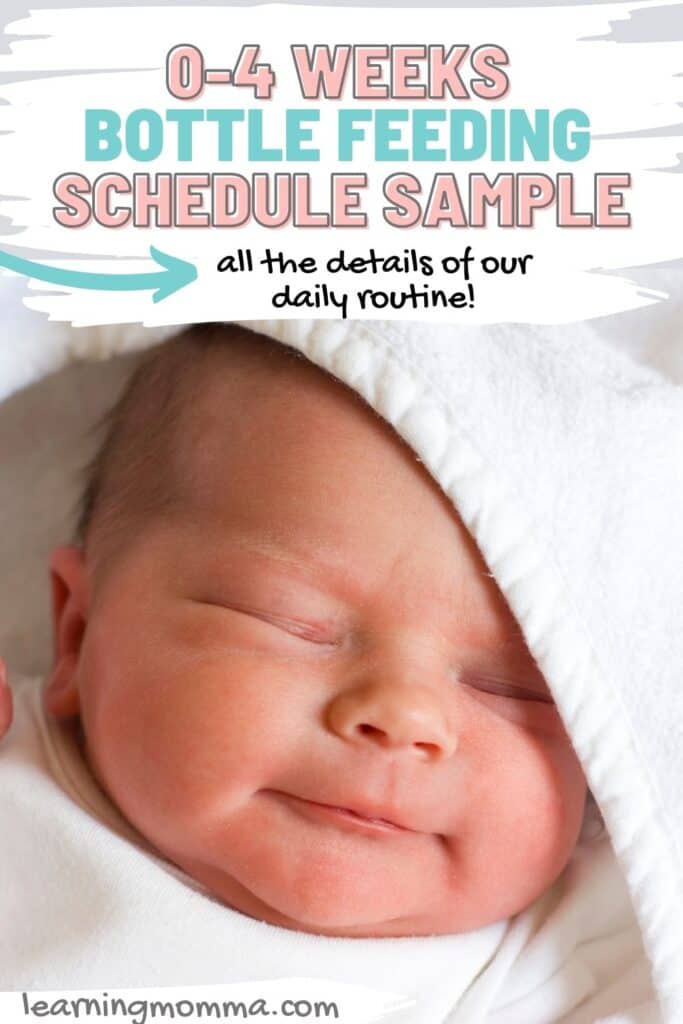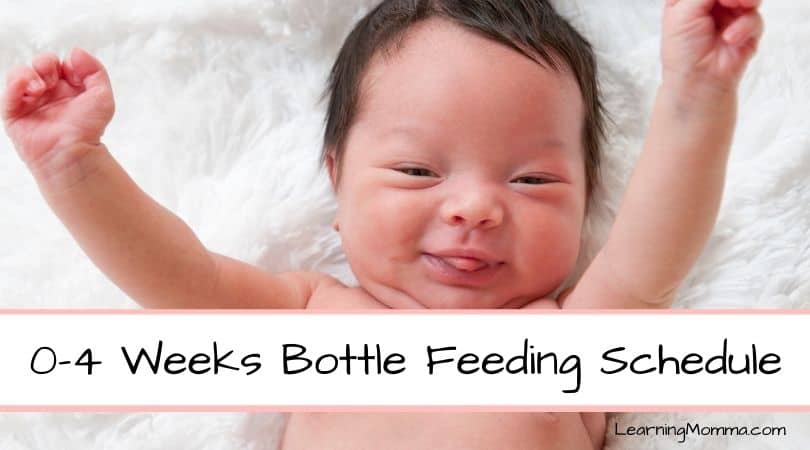Our Newborn Formula Feeding Schedule For Baby’s First Month
This post about our daughter’s newborn bottle feeding schedule might be a little bit scattered (because mom brain is real!). However, I wanted to share the details before they fade too much in my mind. So here’s a breakdown of our newborn daughter’s bottle feeding schedule from birth through 4 weeks old.
(If you’re breastfeeding your newborn you can find breastfeeding schedules from our other daughters here. However, with our third daughter we decided to bottle feed her from birth.)
We started our daughter on the regular Enfamil formula (in the yellow containers). She was on this formula through her whole first month. Around week 5 we switched her to Enfamil Gentlease when she showed some signs of mild constipation. In the hospital the day of and after birth our daughter drank about an ounce at each feeding. A few feedings even during those first couple of days were close to 2 ounces. By the time we brought her home around 2-3 days after birth however she was pretty consistently taking about 2 ounces at each feeding. By the end of week one she was up to 3 ounces per feeding and by week two she was up to 4 ounces. She stayed around 4 ounces for each feeding then through the end of the first month of her life.
(These are the amounts that our daughter took. However, I’m sure every baby is different! Our daughter was a 10lb. 2oz. baby at birth, so she was also very large from day 1 and may have therefore taken more than the average newborn per feeding.)
We are big into sleep training and teaching our babies to settle themselves for naps and nighttime sleep. To do this we keep them on a schedule throughout the day, make sure that we put them down for naps awake (ie. not right after a bottle soothes them to sleep), and we allow them to sleep uninterrupted for as long as they can at night. (You can read some of my tips on sleep training your baby here.) You will see a pattern in our schedule below of eating, then having some awake time, and then going down for naps to support this training. I usually start really trying to gently sleep train and have our babies nap in their cribs around 2 weeks old. Before that I follow the below schedule in general, but allow the baby to be soothed to sleep and nap being held or in an infant seat, etc. The first two weeks are about recovery for me and doing whatever is easiest with the baby to facilitate that!
Because I had gestational diabetes, our baby’s pediatrician was concerned that her blood sugars could dip too low after birth. Therefore for the first week of her life we had to wake her every three hours to feed even overnight since the sugar content of the formula helped to keep her levels where they needed to be. After that first week we started letting her go until she would wake and cry overnight. It was usually no more than 4 hours at a time within the first month. We would wake her for one last bottle around 10:30-11pm and then she would wake crying for an overnight bottle usually somewhere between 3-4am. After that bottle she would typically make it until close to 7:30am. On some occasions she would wake closer to 6:45 or 7am and I would try to soothe her and hold her off until 7:30 to keep her morning wake time consistent. (We don’t use pacis for various reasons, but she is often soothed well by sucking on my pinky finger upside down.)
During the first month of our daughters life we did not keep her awake long. She seemed to reach her max for awake time around 45 min each feeding cycle, including the time it took to feed her each bottle. In the first couple weeks it was even less. So most of her schedule in the first 4 weeks included drinking her bottles, having her diaper changed, and going right back to sleep.
All that said, below is the general schedule that we followed with bottle feeding for our daughter’s first month of life.
Our Newborn Formula Schedule From 0-4 Weeks Old
7:30-8am: bottle & diaper (We usually waited 5-10 minutes after each bottle before changing her diaper since she had a habit of pooping within that time frame. During this first month she had a poopy diaper after almost every feeding, day and night.)
8:45-11am: nap (These were not predictable/always-in-crib naps at this stage. After 2 weeks old we would swaddle her and try to put her down in her crib, but she often still wouldn’t settle and we would have to soothe and help her. In general, we tried our best to keep her asleep for this time period – first in her crib, and if that didn’t work then however else we could.)
11am: bottle & diaper
11:45-2pm: nap
2pm: bottle & diaper
2:45-5pm: nap
5pm: bottle & diaper
5:45-8pm: nap
8pm: bottle, diaper, and nap. (We put her down to “nap” immediately after this feeding since it was essentially her bedtime feeding. The next feeding we woke her just enough to eat and be changed so that it was more of a dream feed or overnight feeding.)
8:20sih-10:30/11pm: bottle, diaper, & back to sleep (Again, we woke her as little as possible at this feeding. The goal was just to get another feeding into her before we went to bed for the night to maximize her sleep time during our overnight sleep time.)
3-4am: bottle, diaper, & back to sleep (We kept all of the lights as dark as possible and interacted with her as minimally as possible. Just offered her the bottle, burped her, changed her diaper, and laid her back down.)
7:30-8am: bottle & diaper for the morning again
–
One more random note to throw in… we swaddled our daughter tight for every nap and overnight in a velcro swaddle. (Those things are amazing if you’ve never tried them!) This helped to prevent her from waking due to her startle reflex. They are a must have for us and for our babies sleep in the early months!
Again, excuse my scattered ramblings as I’m still adjusting to 3 kiddos with a 6 week old as I write this! I hope that somehow this information was still helpful to you. I will keep you posted on future bottle feeding schedules for our newest daughter as she grows.

–






Thank you so much for sharing! We are first time parents and found out that I am not able to produce enough milk so we switched to formula when baby was 10 days old. We’ve been feeding him on cues, typically every 3-4 hours. With your schedule, do you direct when the feedings are during the day and by cue at night? Thank you so much if you see this.
Thank you so much for this. It’s really helpful information. I’m preparing to switch my 6th baby, who is 2 days old, to formula. I was wondering if you could give some tips for handling nighttime bottles. My recovery this time around is a little bit more complicated and I’m trying to figure out how to make those nighttime feeds as restful as possible. It’s SO convenient to just be able to pick up your baby in a dark peaceful bedroom and nurse him back to sleep vs letting him cry while you walk away to mix a bottle. Thanks again for your insight!
I’m sorry it’s been several days now since you posted this and I’m just replying! Absolutely that part of bottle feeding was worse!! It was so much easier overnight when I nursed my others. To make overnight feedings as easy as possible we actually put a mini fridge and a microwave up in our bedroom. (I know it’s a no no to microwave bottles but I did it with my others and it was worth it to heat bottles quickly when needed.) Anyway, since formula can keep for a day or so mixed up if it’s refrigerated I mixed up several bottles ahead of time each evening and threw them in the mini fridge. When she woke overnight needing a bottle I just grabbed one out, shook it up, and since she ended up taking them well cold I was able to give them to her right away.
If there were any bottles left going into the next day I just used them for her morning feedings then so they didn’t sit more than a day in the fridge.
I hope you were able to find a solution that helped!!
Thanks for sharing! Did you use ready to feed or powdered formula from the start? Did you bring your own formula to the hospital?
We only had powdered formula ready at home before our daughter was born. However our pediatrician and the hospital sent us home with some ready to feed formula then. We did not take any along to the hospital – the hospital provided all of the formula that we needed while there and then sent the bit home with us as well. (I think most hospitals do this but doesn’t hurt to check with your doctor.)